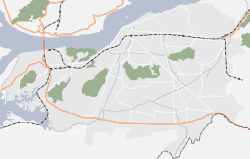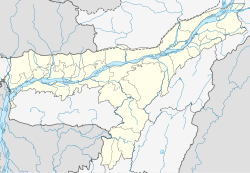Srimanta Sankardev Kalakshetra
This article may need to be rewritten to comply with Wikipedia's quality standards. (December 2012) |
This article contains instructions, advice, or how-to content. (December 2017) |
26°07′50″N 91°49′21″E / 26.1306°N 91.8224°E
 | |
| Established | 9 November 1988[1] |
|---|---|
| Location | Guwahati, Assam, India |
| Coordinates | 26°07′50″N 91°49′21″E / 26.1306°N 91.8224°E |
Srimanta Sankaradev Kalakshetra, commonly known as Kalakshetra, is a cultural institution in the Panjabari area of Guwahati, Assam, India, named after the medieval poet-playwright and reformer Srimanta Sankardev.[2] It includes a cultural museum, library, a children's park, and various facilities for preserving, demonstrating and performing cultural items and history. In addition to being Northeast India's largest cultural congregation, the Kalakshetra is also a major tourist spot in Guwahati. Built in the 1990s, art of Assam and rest of the north-eastern region is displayed here. There are eateries, places of worship, emporiums and open-air theatres within the Kalakshetra premises.


It is governed by a body of executives, selected by the Assam Government's Cultural Department and is headed by a Director of the Assam Civil Service or Indian Administrative Service cadre. The Kalakshetra is divided into several complexes. The Central Museum exhibits the articles used by different ethnic groups of Assam. The museum also houses several cultural objects of the state within it. The open-air theater can accommodate 2000 people and hosts cultural programs in its premises. Traditional dance and drama performances are conducted in this theater. The Kalakshetra also has the Artists' Village, which replicates the village society of Assam. The Sahitya Bhavan is the library in the Kalakshetra, which has a huge collection of rare books and manuscripts. It is a repository of the literature of the region. Another section of the art complex is the Lalit-Kala Bhavan. It is the center used for exhibitions and workshops on art and culture. A heritage park is also a part of the huge complex of the Shankardev Kalakshetra. Now a cable car facility is also available inside the park to commute the tourists. The Bhupen Hazarika museum is another attraction of Kalakshetra.[3]

The Kalakshetra houses number of structures and buildings abiding with the ethnic Assamese designs. A replica of the Rang Ghar (an Ahom Amphitheatre in Sivasagar district of Assam), is positioned in the entrance corridor to the main Central Museum. The Central Museum preserves some of the traditional articles, or artifacts of Assamese culture. The open-air theatre, with a view of the mountainous range of the Khasi Hills, is a venue for a variety of cultural events and an audience of 2000 can see the shows from the gallery seats.[citation needed] What can be termed as the major attraction in the Kalakshetra is an Artistic Village.[citation needed] This village portrays the village life of Assam in the most liveliest of form through life like statues and model thatched huts. The Sahitya Bhawan is an archive of Assamese texts and literatures. The Lalit Kala Bhawan offers an exhibition space for arts and sculptures.The Kalakshetra quite often holds various workshops of dramaturgy, cinema and other performing as well as visual arts.There are murals on the center's surrounding walls. These murals depict various war moments, Bihu dances and other Assamese representations.
Gallery
[edit]-
A Jaapi at Kalakhetra
-
A hut inside Srimanta Sankardev Kalakhetra
-
Bhupen Hazarika Museum at Kalakhetra
-
Manikut inside Kalakhetra
See also
[edit]- Tourism in North East India
- Srimanta Sankardev Kalakshetra at GKDutta.com website
References
[edit]- ^ "Srimanta Sankardev Kalakshetra". Guwahatitimes.com. 24 September 2011. Archived from the original on 2 July 2012. Retrieved 12 March 2013.
- ^ "Srimanta Sankardev Kalakshetra India Tourist Information". Touristlink.com. Retrieved 12 March 2013.
- ^ "Srimanta Sankaradeva Kalakshetra". Kalakshetra-assam.gov.in. Retrieved 12 March 2013.






